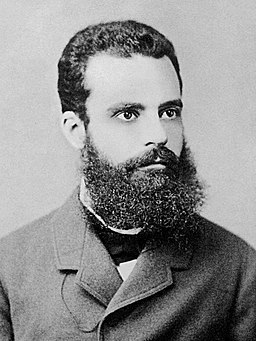
Vilfredo Pareto
1848-1923

Pareto is best known for two concepts that are named after him. The first and most familiar is the concept of Pareto optimality. A Pareto-optimal allocation of resources is achieved when it is not possible to make anyone better off without making someone else worse off. The second is Pareto’s law of income distribution. This law, which Pareto derived from British data on income, showed a linear relationship between each income level and the number of people who received more than that income. Pareto found similar results for Prussia, Saxony, Paris, and some Italian cities. Although Pareto thought his law should be “provisionally accepted as universal,” he realized that exceptions were possible; as it turns out, many have been found.
Pareto is also known for showing that the assumption that the utility of goods can actually be measured is not necessary to derive any of the standard results in consumer theory. Simply by being able to rank bundles of goods, consumers would act as economists had said they would.
In his later years Pareto shifted from economics to sociology in response to his own change in beliefs about how humans act. He came to believe that men act nonlogically, “but they make believe they are acting logically.”
Born in Paris to Italian exiles, Pareto moved to Italy to complete his education in mathematics and literature. After graduating from the Polytechnic Institute in Turin in 1869, he applied his prodigious mathematical abilities as an engineer for the railroads. Throughout his life Pareto was an active critic of the Italian government’s economic policies. He published pamphlets and articles denouncing protectionism and militarism, which he viewed as the two greatest enemies of liberty. Although he was keenly informed on economic policy and frequently debated it, Pareto did not study economics seriously until he was forty-two. In 1893 he succeeded his mentor, Leon Walras, as chair of economics at the University of Lausanne. His principal publications are Cours d’économie politique (1896–1897), Pareto’s first book, which he wrote at age forty-nine; and Manual of Political Economy (1906).
A self-described pacifist who disdained honors, Pareto was nominated in 1923 to a senate seat in Mussolini’s fledgling government but refused to become a ratified member. He died that year and was buried without fanfare in a small cemetery in Celigny.
About the Author
David R. Henderson is the editor of The Concise Encyclopedia of Economics. He is also an emeritus professor of economics with the Naval Postgraduate School and a research fellow with the Hoover Institution at Stanford University. He earned his Ph.D. in economics at UCLA.
Selected Works
Related Entries
Related Links
Liberty and Cynicism: Was Vilfredo Pareto a Liberal? A Liberty Matters symposium at the Online Library of Liberty with Alberto Mingardi, Giandomenica Becchio, Rosolino Candela, and Richard Wagner, November 2018.
Alberto Mingardi, Pareto and Political Optimism, Before and After COVID 19, at EconLog, April 16, 2021.
Pedro Schwartz, The Poverty of Social Choice, at Econlib, November 2, 2015.
